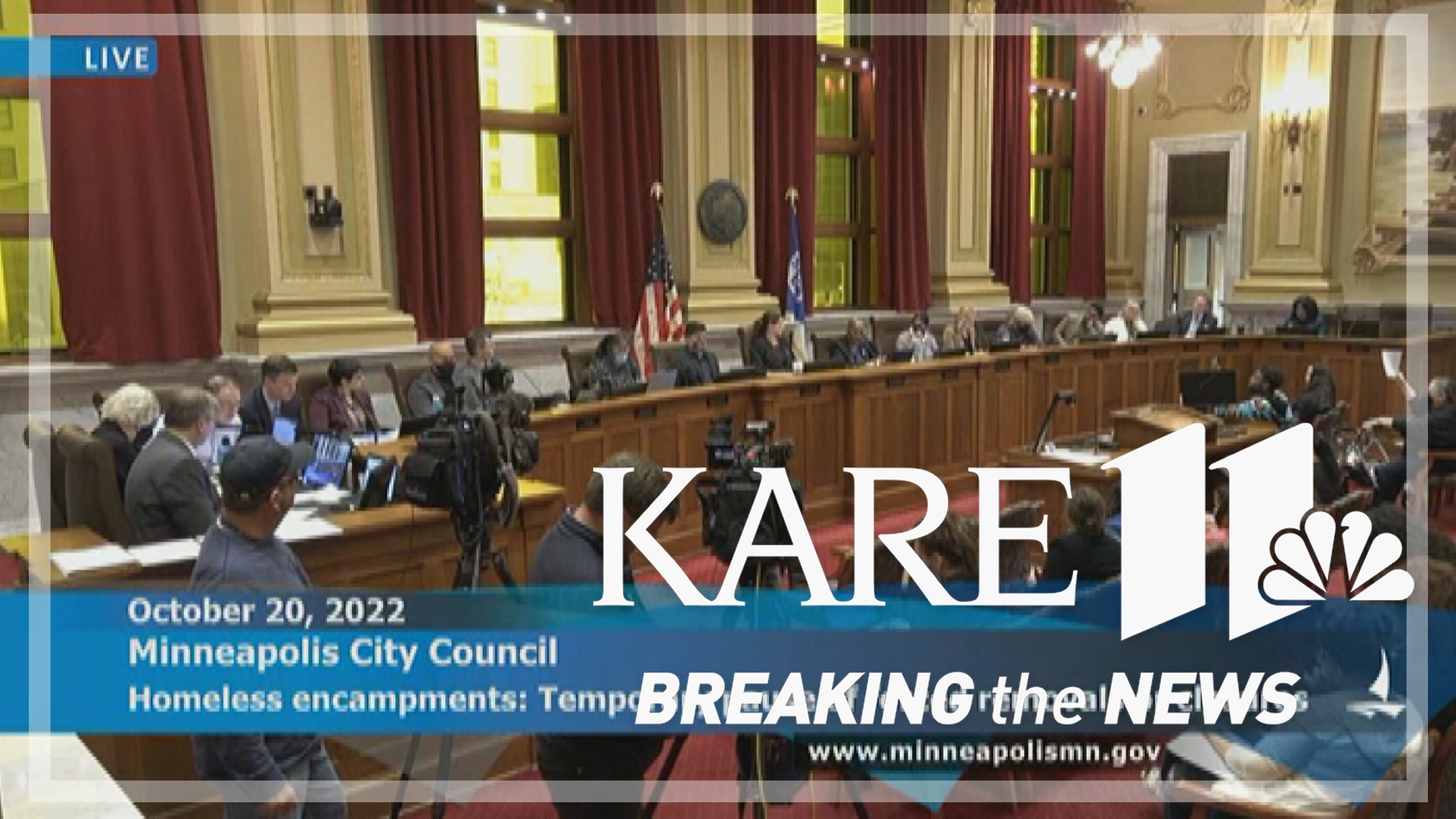MINNEAPOLIS — The Minneapolis City Council voted 8-5 Thursday against a moratorium that would have temporarily stopped the clearing of homeless encampments.
City attorneys told the council that the council doesn't have the authority to prevent staff from enforcing city ordinances. This is also in part, a result of the "strong mayor" structure voters approved back in November. Voters narrowly approved the charter amendment, known as Question 1. On a basic level, the charter now separates the mayor as the "chief executive" and defines the city council as the legislative body.
However, homelessness is an issue that is complex, and some service providers say it's beyond just a moratorium.
Mike Goze, the CEO of American Indian Community Development Corporation said he's disappointed the moratorium was discussed.
"My initial reaction was disappointment that it was even brought to the council," Goze said. "Of the five council members that brought it up to the council — (the) whole council for a vote — not one of them has reached out to me."
Goze, along with many nonprofits, has been a part of fighting homelessness in Minneapolis. In 2020, he said the AICDC started Homeward Bound Shelter, a 24-hour shelter that is culturally-competent, geared toward making Indigenous folks facing homelessness more comfortable.
Goze explained his disappointment. He said a moratorium does not tackle any of the root causes that exacerbate the complex issue of homelessness.
RELATED: A permanent home in Powderhorn
However, he clarified that he is not on the side of keeping encampments either.
"AICDC doesn't support a tent as a standard of living, period," Goze said. "I think encampments create an added venue for attracting homeless folks, because, again, attracting addicts that become homeless."
The method the city of Minneapolis has used in clearing the encampments recently has made headlines.
Rico Morales, a resident at housing that Our Saviour's Community Services provides, said the abrupt disruption of lives by way of clearing encampments is traumatic and inhumane.
"People can't be just discarded and picked up as garbage and trash," Morales said. "These are not people living outside in dumpsters, these are our brothers and sisters living outside, these are not just the homeless people."
When asked what he thought was a "humane closure" of an encampment, Morales said that's something that everyone needs to work on figuring out.
"We have not yet begun to solidify or codify in the city of Minneapolis," Morales said.
Our Saviour's Community Services Executive Director Mike Huffman said groups working on homelessness need to be more solutions-oriented.
"We need individualized solutions to solve homelessness, we need people who come along side folks who don't have homes currently, and we are doing that work here," Huffman said, "We know that there are ways to get people and move people from the street into housing and have that be a long-term solution for them."
The question is how can that be done without causing further harm, and with respect. Issues like addiction and trauma people may have faced within shelters only add to the difficulty of finding those solutions.
"Not necessarily everybody is going to be comfortable with coming indoors, and living in a way that you think might be comfortable for them," Morales said.
"It has to be a coordinated effort by the city, by the police, by the county and the state, because the resources come from those places," Goze said.
KARE 11 has reached out to Minneapolis City Council member Jason Chavez, who represents the district that Goze is in. Chavez said in a statement:
“I’m having breakfast with Mike Goze this Thursday to talk about homelessness.
I supported the temporary pause, research on a non-police response to evictions, and storage for unhoused neighbors because the way encampment clearings are being carried out is not in the way their policy says they should be.
With winter being near, we need better policies and practices. I look forward to coming up with a solution with Mike on Thursday.
The city council did pass a few other measures regarding homelessness, including dedicating staff to studying existing encampments, and a request to Mayor Frey to provide data on the cost of closing the encampments.
Watch more Breaking The News:
Watch all of the latest stories from Breaking The News in our YouTube playlist:

